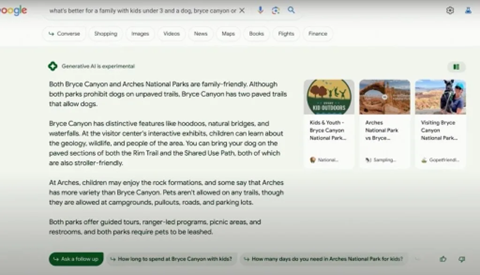Last week, Google gathered to announce all the things they’re developing.
Google’s reveals focused on its main product and revenue model – search and advertising. Not surprisingly, those two categories pique the interest of marketers everywhere. But we’ll get to that in a minute.
Among the more fun news comes an immersive view for routes in Google Maps for some cities, an AI-powered Magic Editor for photos, and an AI-driven Magic Compose tool to rewrite more positively, professionally, or Shakespearean-like text. (Google seems to equate AI and magic.)
Google shared news about Bard, its ChatGPT competitor. The waitlist is gone, and the tool operates in English, Japanese, and Korean. Plus, it can surface images in its responses, some of which may be integrated with Adobe’s AI art generator Firefly and possibly modified in Adobe tools.
Now, onto the biggest-but-less-noticed Google announcement.
CMI’s chief strategy advisor Robert Rose shares his thoughts in this week’s CMI News video. Watch it below, or keep reading for the highlights:
The biggest news for marketers
What marketers care about came as almost a throwaway line in all the cool new features: Google plans to change the presentation of search results. To no one’s surprise, the look will integrate artificial intelligence.
@Google plans to change the presentation of search results and integrate artificial intelligence, says @CMIContent via @Robert_Rose. Click To TweetRobert says the fascinating development portends interesting implications for marketers who care about the future of organic search.
In Google’s demonstration at the I/O Conference, someone “asks” the search engine: “What’s better for a family with kids under 3 and a dog, Bryce Canyon or Arches National Park?” Google Search returns a lengthy answer detailing the pros and cons of each.
“Now, search does the heavy lifting for you,” explains Cathy Edwards, vice president of Google Search, during the conference.
But does it? Does it really?
“If you read the response, it reads very much like what’s now beginning to become a classically formatted generative AI response,” Robert says.
Here’s how the result returned by the experimental generative AI:
Both Bryce Canyon and Arches National Parks are family-friendly. Although both parks prohibit dogs on unpaved trails, Bryce Canyon has two paved trails that allow dogs.
“Bryce Canyon has distinctive features like hoodoos, natural bridges, and waterfalls. At the visitor center’s interactive exhibits, children can learn about the geology, wildlife, and people of the area. You can bring your dog on the paved sections of both the Rim Trail and the Shared Use Path, both of which are also stroller-friendly.
“At Arches, children may enjoy the rock formations, and some say that Arches has more variety than Bryce Canyon. Pets aren’t allowed on any trails, though they are allowed at campgrounds, pullouts, roads, and parking lots.
“Both parks offer guided tours, ranger-led programs, picnic areas, and restrooms, and both parks require pets to be leashed.
Robert explains, “The answer is quite logical, well-constructed, has a lot of adjectives, and, ultimately, provides little value.”
Even @Google couldn’t return a valuable #AI-generated result to the searcher example it shared, says @CMIContent via @Robert_Rose. Click To TweetIt pulls relevant but general features from both parks. It attempts to distinguish between the two by saying Bryce allows dogs on two paved trails. But a bit more digging would have led the searcher to discover both parks have the same policy – dogs are allowed on paved roads. Bryce just has a few paved roads that are part of some trails.
Though the result attempts to draw distinctions, a vague partial statement acts as the only real hint at the differences, “… some say the Arches has more variety than Bryce Canyon.”
But what that means isn’t terribly clear, and it wasn’t asked in the search question.
At the end of the text response, Google offers up three options to explore further:
- “Ask a follow up.”
- “How long to spend in Bryce Canyon with kids?”
- “How many days do you need in Arches National Park for kids?”
Those closing options could easily be turned into sponsored links to keep the Google gravy train rolling.
2 steps to sidestep deathly predictions
“I don’t mean to pick on Google. The tech just demonstrates what may be coming,” Robert says. “But I do want to pick on the knee-jerk reaction that search traffic will diminish, or this will kill publishers.”
You can expect search engines like Google, YouTube, Bing, Amazon, and many other verticalized products to eventually evolve like what Google demonstrated this past week.
So, Robert says, ask yourself how your brand will respond now and what it will do about it in the long term. He sees at least two safe bets to survive the future impact of AI on search results.
First, create content that not only attracts but retains an audience. Focus on more than getting people into your sphere of influence – your website, email, content hub, store, etc. Plan on how to keep people at your content by becoming a trusted, bookmarked source.
Second, invest in owned media by understanding how to create content in the context of questions asked. The expertise powering any AI search relies heavily on accessing owned media. It also uses a large language model (LLM) to learn that information.
“Look at your content through the lens of a searcher who wants to distinguish between the most important aspects of their question,” Robert says.
Understand how to create #content that answers questions asked by searchers who want to distinguish differences, says @Robert_Rose via @CMIContent. Click To TweetGo back to Google’s example of the two U.S. parks. The searcher wanted to know which park is better for a family with a dog. When CMI’s human (aka Robert) spent 10 minutes digging into both parks’ websites, he found they did well detailing why dogs aren’t great to bring to the parks. However, neither explained why it would be suitable for a pet.
What haven’t you written about but should?
You often talk about the greatness of your business, products, and industry on your websites, blogs, and resource centers. But what’s not so great? Who do you not serve? Make it easier for searchers to see the distinctions.
“You can’t know where Google and other search engines’ AI will go, but you can know it’s going,” Robert says.
What do you think of the changes? Let us know in the comments.
HANDPICKED RELATED CONTENT:
Cover image by Joseph Kalinowski/Content Marketing Institute


